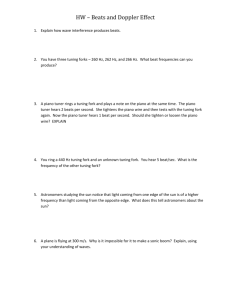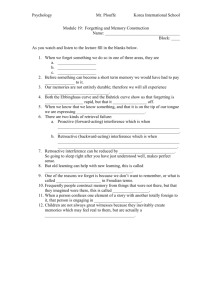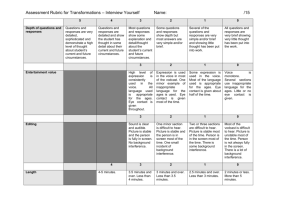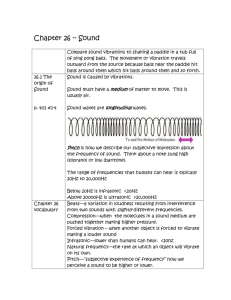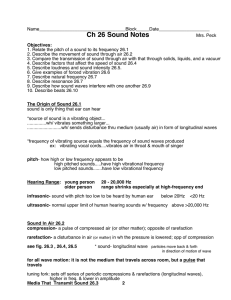Chapter 20/21
advertisement
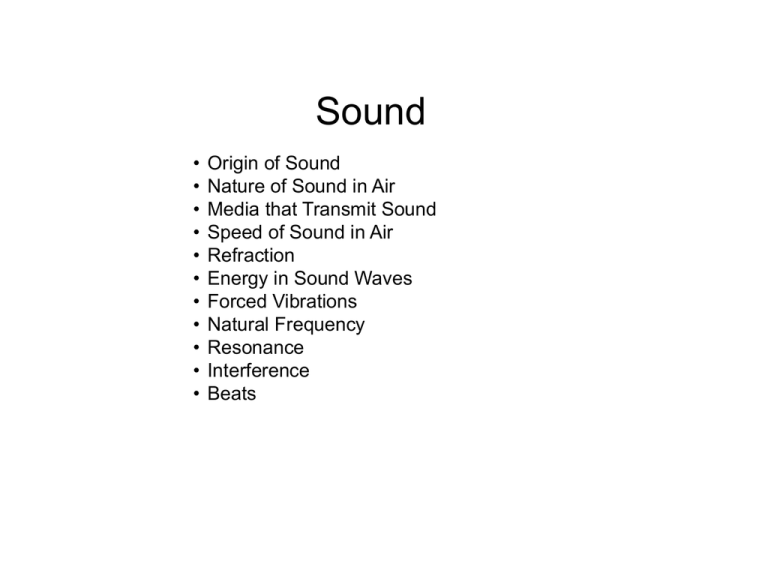
Sound • • • • • • • • • • • Origin of Sound Nature of Sound in Air Media that Transmit Sound Speed of Sound in Air Refraction Energy in Sound Waves Forced Vibrations Natural Frequency Resonance Interference Beats Sound... • ...a longitudinal wave in air caused by a vibrating object. • Sound requires a medium. – solid, liquid or gas – Will a bell ring in a evacuated Bell Jar? Nature of Sound in Air • Sound waves have compression and rarefaction regions. Origin of Sound • infrasonic – frequencies < 20 Hz • ultrasonic – frequencies > 20,000 Hz • human hearing range – frequencies between 20 Hz and 20,000 Hz Speed of Sound in Air • 340 meters/second • 760 miles/hour • Mach 1 SPEED OF SOUND How it varies: increases with humidity increases with temperature increases with density Lightning and Thunder What is the approximate distance of a thunderstorm when you note a 3 second delay between the flash of the lightning and the sound of the thunder? What is the approximate distance of a thunderstorm when you note a 3 second delay between the flash of the lightning and the sound of the thunder? Answer: 3 seconds 340 meters/second = 1020 meters Acoustics... • ...the study of sound properties. • When a sound wave strikes a surface it can be.… – – – – (a) reflected. (b) transmitted. (c) absorbed. (d) all of these. Acoustics... • ...the study of sound properties. • When a sound wave strikes a surface it can be.… – – – – (a) reflected. (b) transmitted. (c) absorbed. (d) all of these. Reflection of Sound • e.g. an echo • Reverberation - re-echoed sound, multiple reflections of sound waves from walls • Compare reflections from a hard wall with that from a carpet wall. Refraction of Sound • Refraction - the bending of a wave • Sound travels faster in warm air than in cool air. • Sound waves bend toward cooler air. Speed of Sound • Subsonic - slower than the speed of sound • Supersonic – faster than the speed of sound Mach Number = speed of object speed of sound Forced Vibrations/Resonance • …the setting up of vibrations in an object by a vibrating force. • Examples of Forced Vibration: – A tuning fork touching a wood surface – Sounding boards for stringed instruments – Matching tuning fork boxes • During forced vibration sound is intensified because a larger surface area is available to vibrate air molecules. Resonances Sound Interference • Overlapping compressions of a sound wave will result in… – …constructive interference. – …and a louder sound. • Overlapping a compression and a rarefaction results in... – …destructive interference. – …and a softer sound. Constructive Interference Destructive Interference Sound Interference • Noise reduction headphones • Echo cancellation Beats • Beats - the periodic variation in loudness of two sounds played together • The beat frequency is equal to the difference in the frequency of the two sounds. For the same temperature for air, does sound travel faster in humid Galveston or in dry El Paso? (a) Galveston (b) El Paso (c) same speed in either city For the same temperature for air, does sound travel faster in humid Galveston or in dry El Paso? (a) Galveston (b) El Paso (c) same speed in either city The bending of sound through air of uneven temperature is called (a) reflection (b) refraction (c) interference (d) reverberation (e) resonance The bending of sound through air of uneven temperature is called (a) reflection (b) refraction (c) interference (d) reverberation (e) resonance Lightning is seen, then ten seconds later thunder is heard. Approximately, how far away in meters is the thunder cloud? (a) 10,500 m (b) 5280 m (c) 1050 m (d) 3400 m (e) 680 m Lightning is seen, then ten seconds later thunder is heard. Approximately, how far away in meters is the thunder cloud? (a) 10,500 m (b) 5280 m (c) 1050 m (d) 3400 m (e) 680 m A 250 Hz tuning fork and a 260 Hz tuning fork are vibrating near each other. How many beats per second are heard? (a) 255 (b) 510 (c) 10 (d) 250 (e) 260 A 250 Hz tuning fork and a 260 Hz tuning fork are vibrating near each other. How many beats per second are heard? (a) 255 (b) 510 (c) 10 (d) 250 (e) 260 Musical Sounds Noise Versus Music • What is the difference between noise and music? – Answer: The appearance of the waveform. Mac Mic NOISE VERSUS MUSIC Same Note - Different Instrument • Harmonic – a partial tone that is an integer multiple of the fundamental frequency • Fundamental Frequency – the lowest frequency of vibration – a.k.a. the first harmonic Back Sound Intensity and Loudness • Intensity of Sound – refers to the amplitude of the pressure variations in the sound wave • Loudness – the physiological sensation directly related to the sound intensity – measured in bels – 1bels = 10 decibels • Loudness – A sound of 10 decibels is or 101 or 10 times as intense as 0 decibels. – 20 decibels is 102 or 100 times the intensity 0 decibels. – How much more intense is sound at 100 dB than sound at 50 dB? • Answer: 100000 times Source of Sound Threshold of Hearing Conversation Ear Damage Begins Amplified Music Jet Airplane at 30 meters Loudness (db) 0 60 85 110 140 Common Sound Intensities Source of Sound Intensity (W/m2) Sound Level (db) Jet 30 m away 102 140 Air-raid siren, nearby 1 120 Disco music, amplified 10-1 110 Riveter 10-3 90 Busy street traffic 10-5 70 Conversation in home 10-6 60 Quiet radio in home 10-8 40 Whisper 10-10 20 Rustle of leaves 10-11 10 Threshold of hearing 10-12 0

